For the last year, the fight over the Cross-Strait Services in Trade Agreement (CSSTA, or Fu-Mao for short) has taken center stage in Taiwanese politics. Although Fu-Mao has been the top policy priority of the Ma administration since it was signed June 21, 2013, it remains under review by the Legislative Yuan. Improving the prospects for Fu-Mao passage was probably the primary motivation behind the attempt to expel Legislative Yuan Speaker Wang Jin-pyng from the KMT. The opposition Democratic Progressive Party (DPP) and its nominal ally, the Taiwan Solidarity Union (TSU), devoted much of their time working to slow the review process in the legislature, from initiating a physical confrontation in the LY over how the agreement would be reviewed, to demonstrations in hearings, to using parliamentary tricks to upset committee sessions. By the time Chang Ching-chung (張慶忠), the convener of the Internal Administration Committee, unilaterally announced that Fu-Mao had passed the committee in the now-infamous "30-second review" on March 18, 2014, the agreement had already languished for nine months.
The apparent success of the pan-Green parties in blocking Fu-Mao, despite not holding anything close to a majority in the legislature (the DPP and TSU together have only 43 of 113 seats, or 38%), suggests at first glance that a highly motivated minority can exercise de facto veto power over all legislative business. How you feel about that probably depends on your view about cross-Strait trade agreements: -pan-Blue types (i.e. pro-KMT) tend to think of this as a "tyranny of the minority" and a terrible affront to the democratic principle of majority rule, while pan-Green types like to characterize it as a heroic, nation-saving stand in the face of a ruling party captured by Chinese interests. But if we step away from the particular issue of Fu-Mao, and think about what's best for Taiwan's democracy in the abstract, allowing minority parties an effective veto over anything they don't like is troubling.
Imagine if the partisan roles were reversed. In fact, let's take a DPP dream scenario: say, a hypothetical President Tsai Ing-wen taking office in 2016, and enjoying a newly elected pan-Green majority in the legislature, attempts to win legislative approval for a special budget to purchase a new arms package just approved by the U.S. Then imagine the opposition pan-Blue parties, despite controlling only a minority of the seats, effectively blocking this proposal, as they did several times (with a majority) during the Chen Shui-bian administration? If you're a pan-Green supporter, you're very quickly going to change your tune about minority party rights and heroic boycotts and blockades, no? So, if minority parties really are able to exercise a de facto veto in the legislature, that does not bode well for coherent policy change in a place whose political elites are highly polarized over anything to do with cross-Strait relations. You're effectively stuck with the status quo.
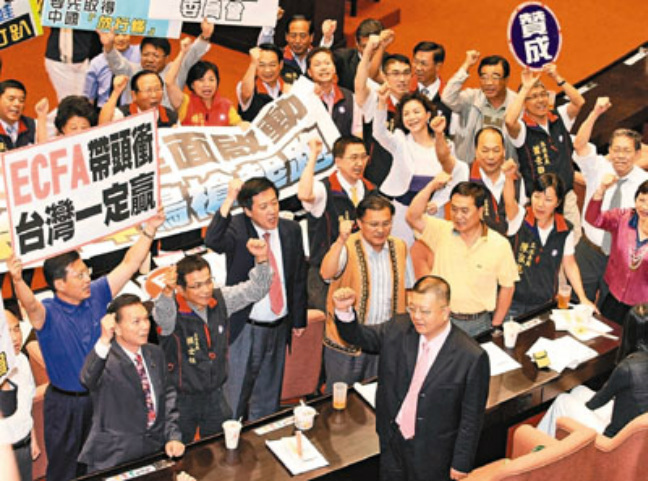 KMT legislators celebrate the passage of the Economic Cooperation Framework Agreement (ECFA) in the Legislature, August 16, 2010.
KMT legislators celebrate the passage of the Economic Cooperation Framework Agreement (ECFA) in the Legislature, August 16, 2010. Now, let me strike a more optimistic note: I do not actually think the opposition parties have an effective veto over everything in the LY. On the contrary, in President Ma's first term, the Economic Cooperation Framework Agreement, which created the foundation for subsequent cross-Strait agreements like Fu-Mao and was also fiercely opposed by the DPP and TSU, passed the legislature only six weeks after it was signed.
What the approval of ECFA indicates to me is that a president can get his priorities passed by the LY, even in the face of opposition party boycotts and blockades, if two conditions hold: (1) his party has a working majority, and (2) his own party's legislators are willing to vote the party line. What Ma is missing right now on Fu-Mao is the second: support from KMT legislators. In other words, the key disagreement over Fu-Mao right now is within the KMT, not between the Ma administration and the DPP or Speaker Wang.
This claim is not obvious, and it's more of a working hypothesis than a firm conclusion. But from conversations with political insiders and a close reading of actions in the LY, I'm increasingly convinced there was, even a year ago, significant opposition in the KMT's legislative caucus to Fu-Mao--enough opposition, in fact, that the agreement would probably have been rejected if the vote were secret.
| Why is the KMT, rather than the obstructionist tactics of the DPP, key to explaining the failure of the legislature to approve Fu-Mao? Because those tactics are only effective if the majority party isn't well-organized or committed to counter them. For instance, take the primary weapon the opposition uses: blockading the speaker's podium (霸佔主席台), which physically prevents Speaker Wang from gaveling in the legislative session (which normally happens every Tuesday and Thursday at 9am when the legislature is in session). This action is, roughly speaking, the Taiwanese version of a filibuster. Without a formal commencement of the legislative session, no LY business can be conducted, and actions such as the review of Fu-Mao cannot commence. So what's to prevent the minority parties in the legislature from doing this all the time? The majority party tactic that's been used in recent years is to have a physical confrontation in the legislative chamber with blockading opposition legislators. As crazy as this might sound to the uninitiated, the majority party can clear a path to the podium by rallying all of its members to the LY floor and shoving the opposition out of the way in what looks like a rugby scrum. The video shown here (also see the photo at left) is an example of a successful effort. It's easy to get so distracted by all the chaos and the spectacle of elected legislators throwing things at one another that you miss the critical outcome of this scrum: Speaker Wang gavels in the session to begin the second reading of ECFA. (One can just make him out at the back of the crowd, waiting for a path to clear. The video shows more of the sequence.) The KMT caucus then votes down a series of motions by the DPP to stall or to make ECFA subject to an item-by-item review. |
If you think about it a bit, these kinds of physical confrontations shouldn't happen very often. They impose a cost on everyone: they attract a lot of negative media attention to the institution (including from CCTV in China!), people get hurt, etc. So there's an incentive for all sides to work out a compromise that precludes a public confrontation on the floor. The reason this doesn't happen all the time, I would guess, is uncertainty: neither party knows just how credible any given threat is by the KMT to initiate a confrontation in the LY and end a blockade. In the ECFA case, the July 8 showdown ended any uncertainty that the KMT would be able to mobilize its caucus to defend the speaker and end the blockade of the podium--in other words, that almost all KMT legislators supported ECFA and were willing to do whatever it took to get it passed. Once that became common knowledge, the DPP had only symbolic options left, like walking out of the legislative session in protest and getting an article-by-article vote it knew it would lose.
So that brings us back to Fu-Mao, the Cross-Strait Services in Trade Agreement (CSSTA). If the KMT managed to get ECFA through the legislature in six weeks in 2010, then why wasn't it able to do the same for Fu-Mao in 2013? Nothing fundamental has changed in the legislature: the KMT lost some seats in the last election, but the party still has a significant majority (64/113, or 57%), even discounting the four additional legislators from the People First Party and Non-Partisan Solidarity Union who in general have voted with the KMT. The DPP and TSU are still quite solidly in the minority.
What has changed is public opinion, both toward President Ma and cross-Strait trade relations. When ECFA was signed in June 2010, Ma's public approval rating was about 47%--not great, but reasonably high given that Taiwan's economy was recovering from a severe recession that began almost as soon as he came into office. Public support for ECFA was also positive: a TVBS survey in May 2010 found 41% of respondents approved of signing the agreement, while 34% disapproved.
By contrast, shortly after Fu-Mao was signed in June 2013, TVBS found public opinion running against the agreement, 47-30%, and Ma's approval rating at only 13%, with an astounding 73% of respondents disapproving of his performance, an all-time high. This was before any of the events of the subsequent year, including the Ma-Wang fight and the Sunflower Movement.
Given these polling numbers, it's not hard to see why support for Fu-Mao in the KMT caucus might have been a lot weaker than the party elites wanted to admit. Not only did legislators have to worry about all the criticism coming from industry groups and constituents within their districts. They also had to worry about the electoral consequences of taking a public stand in favor of an unpopular trade agreement with China, while going out on a limb for an even more unpopular president who's spent most of his time in office keeping them at arm's length. But Ma is still the party chairman, and has repeatedly indicated he's willing to discipline KMT members who don't toe the party line on this issue. That's the definition of being stuck between a rock and a hard place (進退兩難).
So then the DPP comes along and blocks the speaker's podium, and dissenting KMT members have an escape hatch: publicly say nothing so as not to violate party dictates, but privately avoid being anywhere near the legislature when it comes time for a show of force to get the DPP to stand down. It's not a coincidence that there was another major showdown at the speaker's podium on June 25, 2013, shortly after Fu-Mao was signed on June 21. This one did not go so well for the KMT, or at least for Ma's allies: after six hours of altercations, the parties agreed to an extensive item-by-item review of Fu-Mao, against the wishes of the Ma administration. Buried in the news reports of this confrontation are two revealing differences with ECFA. First, the KMT leadership itself started the standoff by ordering legislators to try to secure the speaker's podium at 6:30am, to preempt pan-Green legislators who were planning to do the same. Second, they failed, in part because there were many fewer KMT legislators present than in 2010--note the failure to block off the back door. I'm willing to bet there are a few KMT members who were secretly thrilled with this outcome, because it got them off the hook from having to support an unpopular agreement or else face party discipline.
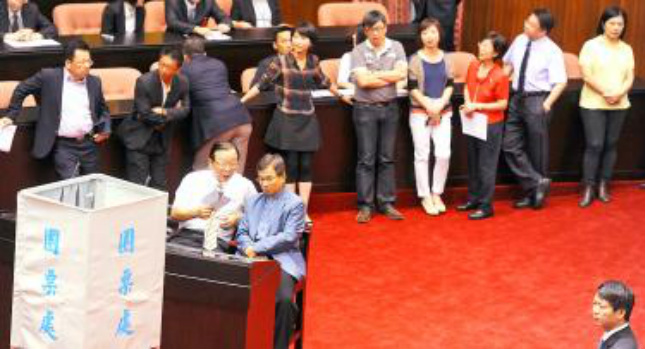 DPP legislators block access to the voting box in the legislature, preventing a vote on Control Yuan nominees, July 4, 2014
DPP legislators block access to the voting box in the legislature, preventing a vote on Control Yuan nominees, July 4, 2014 Politics in the Legislature: Messy, but Responsive to Public Opinion
Let me sum up what is now a rather long post. I've argued that there are some important strategic reasons behind all the spectacle of fights and occupations in the legislature:
- The Taiwanese legislature features a limited minority veto;
- When the majority party is cohesive and disciplined, minorities can't generally stop things they oppose;
- But when there's dissent within the majority party, minority party obstruction becomes highly effective.
If you buy this argument, then the implication for democracy in Taiwan is a lot better than I implied in the last post: minorities in the LY don't generally exercise vetoes over everything they don't like, and majority parties, especially when they have public opinion on their side, can indeed get controversial things passed. It's only when public opinion is running strongly against something the executive wants that it's likely to stall in the legislature. And if you think elected representative parliaments should be broadly responsive to changing public opinion, then that's probably a good thing.
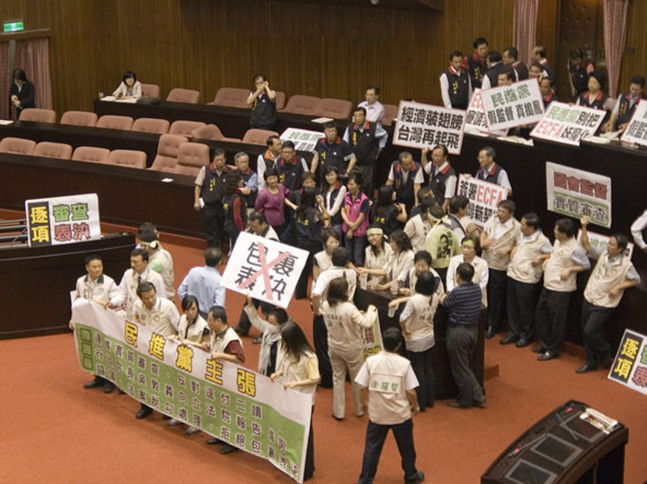
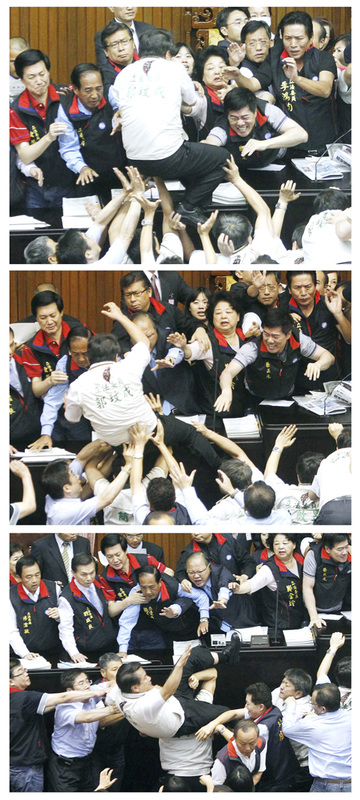
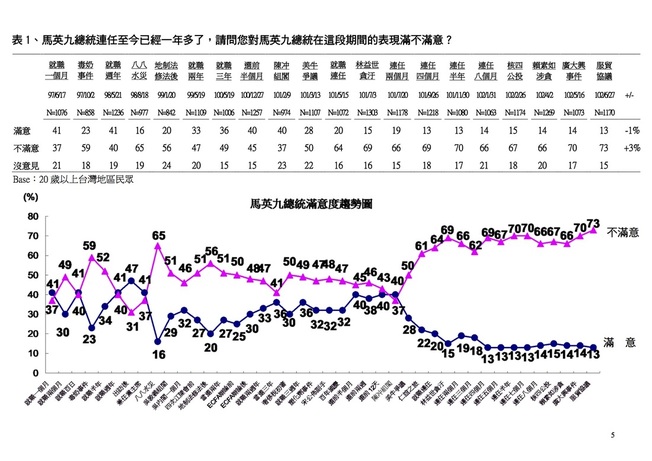
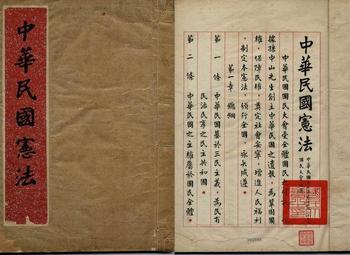
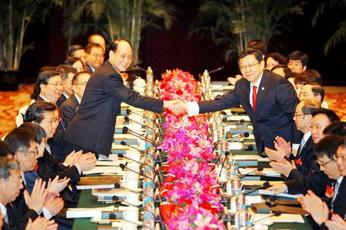
 RSS Feed
RSS Feed
